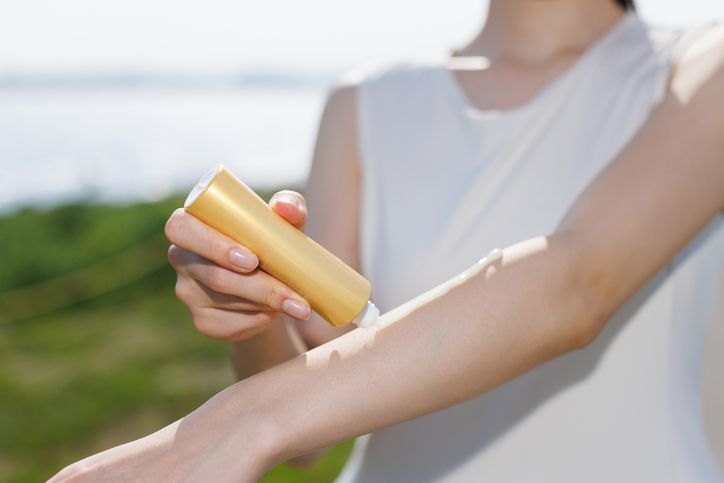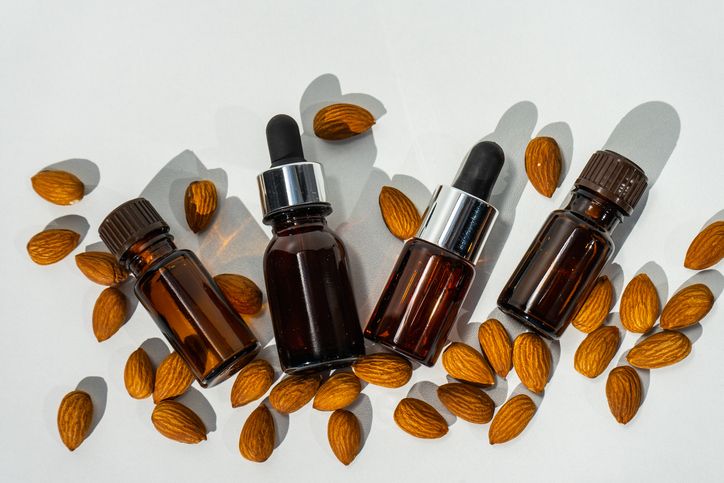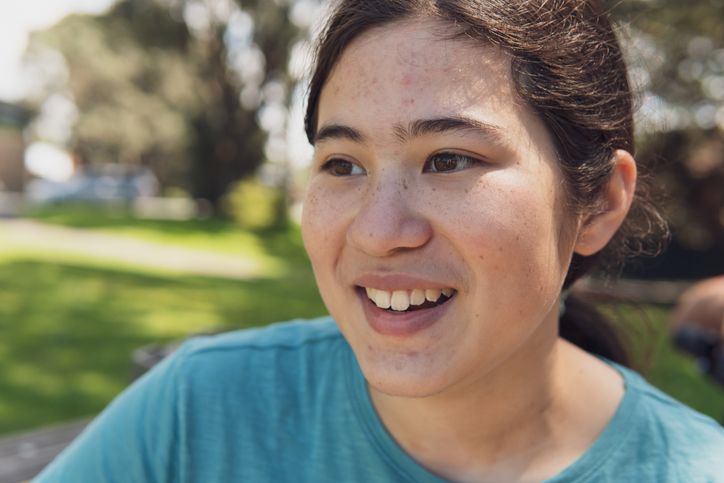- Home
- Trend
- Weight Loss Strategies
- Acne Tips
- Hair Health Information
- Blemish Removal Tips
- Acne Scar Removal Tips
- Muscle Building Techniques
- Intimate Care Tips
- Postpartum Intimate Care
- Eye Bags Wiki
- Tips for Face Slimming
- Secret of Permanent Hair Removal
- Breast Enlargement Tips
- Cure to Snoring
- Marionette Lines
- Skin-Tightening Secrets

免費體驗
F8 Hair Regrowth Treatment
1 Minute Self-Registration
Date should not be before minimal date
While it's part of life's routine for a few strands of hair to bid farewell daily, a shower that resembles a mini-hair-fall event might be signalling something more profound. Addressing this concern can lead you to a path of healthier, happier hair. Just as your body alerts you to changes in other aspects of your health, it's doing the same with your hair. So, don't just let those strands disappear down the drain without a second thought. Dive into the world of hair care, find out what your locks might be trying to tell you, and embark on a journey to reclaim the glory of vibrant, resilient hair.
1
10 Signs that You Should Start Taking Hair Fall Seriously
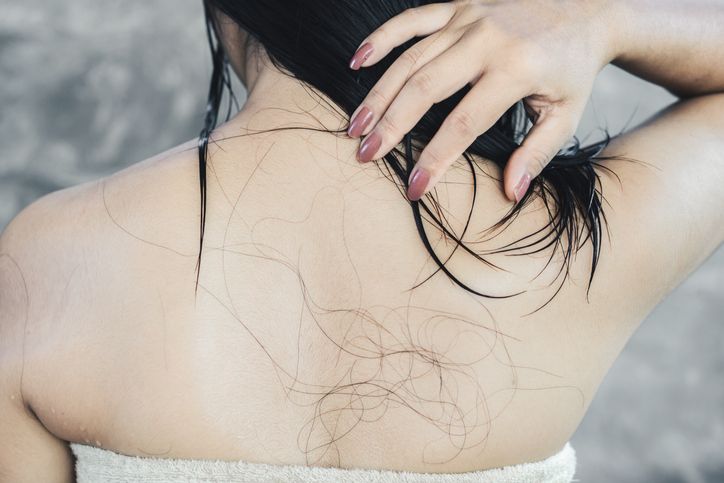
1. Increased hair strands in the drain
If you've noticed a significant uptick in the number of hair strands accumulating in your shower drain after each wash, it's a possible indicator of excessive hair fall. This could be due to various factors, such as changes in your hair's growth cycle or underlying health issues.
2. Hair falls too fast and frequent
Gradual thinning of your hair, especially noticeable around the crown or the top of your head, could signify progressive hair loss that needs attention. This type of hair loss might be associated with factors like genetics, hormonal changes, or ageing.
3. Visible scalp
If you find that more of your scalp is becoming visible than usual, it could be linked to hair thinning or excessive hair shedding. This may result from a disruption in the hair growth cycle or other contributing factors.
4. Receding hairline
A receding hairline, where your hairline starts to move backward, is a common characteristic of male pattern baldness. If this change is concerning you, it's worth seeking advice from a healthcare professional who specialises in hair health.
5. Excessive hair on pillows and clothes
Noticing an unusual amount of hair on your pillows, bed sheets, or clothes might suggest excessive hair shedding. While some hair shedding is normal, a sudden increase in shedding could indicate an underlying issue.
6. Hair breakage
Hair fall can sometimes coincide with hair breakage, where the individual hair strands become weak and prone to breaking. This could be due to factors like harsh styling practices, excessive heat, or certain hair care routines.
7. Changes in hair texture
If you observe alterations in your hair's texture, such as increased dryness, brittleness, or a lack of shine, these changes might be connected to hair fall. Poor hair health can result in changes to the hair's appearance and texture.
8. Family history of hair loss
A family history of hair loss, particularly if it runs through your parents or grandparents, could suggest a genetic predisposition to experiencing hair fall. Genetic factors play a role in various types of hair loss.
9. Medical conditions or medications
Certain medical conditions like thyroid disorders, autoimmune diseases, or the use of medications such as chemotherapy can lead to hair fall. If you suspect a medical condition might be causing your hair loss, consulting a medical professional is crucial.
10. Stress or significant life changes
Heightened stress levels or major life events can trigger a type of hair loss called telogen effluvium. This condition disrupts the hair growth cycle and leads to excessive shedding. Managing stress and seeking professional guidance can help address this issue.
If you're noticing any of these signs, it's important to take proactive steps to address the situation. Consultation with a dermatologist or trichologist is recommended in order to diagnose the underlying cause of your hair fall and develop an appropriate treatment plan.
2
How Much Hair Loss Is Normal? How Do I Know If It's Because of Shampoo?
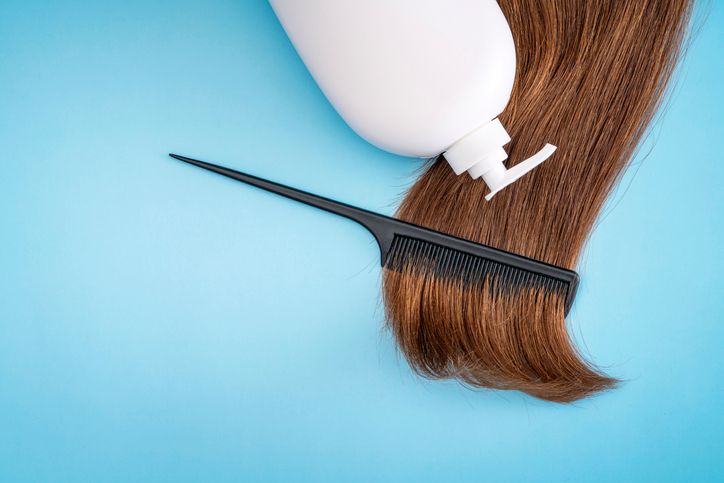
Determining whether your shampoo is causing hair fall can involve observing certain factors and making some considerations. Here's how you can assess if your shampoo might be contributing to hair fall:
Timing of hair fall
Pay attention when you notice hair fall. If you've recently switched to a new shampoo and notice an increase in hair fall shortly after the switch, it could be a sign that the shampoo is not suitable for your hair.
Ingredients and formulation
Check the ingredients list on your shampoo bottle. Look for harsh chemicals like sulphates, parabens, and silicones. These ingredients can strip your hair of its natural oils, leading to dryness, weakening of hair strands, and ultimately, hair fall.
Scalp irritation or sensitivity
If your scalp feels irritated, itchy, or sensitive after using a particular shampoo, it might not be compatible with your skin. Irritation can lead to hair fall as well.
Changes in hair texture and appearance
If your hair becomes excessively dry, brittle, or dull after using a certain shampoo, it could be due to the shampoo's formulation. Poor hair health can contribute to hair fall.
Excessive tangling and breakage
If your hair is prone to tangling and breakage after shampooing, it might indicate that the shampoo is not providing enough moisture or is causing damage to your hair.
Frequency of use
Using shampoo too frequently can strip your hair of its natural oils, leading to dryness and weakening of hair strands. Over time, this can contribute to hair fall.
Lack of improvement
If you've been using a particular shampoo for an extended period and haven't seen any improvement in your hair health, it might be worth considering whether the shampoo is contributing to your hair fall.
Consultation with a professional
If you're uncertain about the role of your shampoo in your hair fall, consider seeking advice from a dermatologist or a trichologist. They can assess your hair and scalp condition and recommend suitable products.
- Stress-Induced Hair Loss is Affecting Younger People! Can Laser Therapy Help?
- Does Creatine Cause Hair Loss? The Rumour & The Truth
- Anti-Hair Loss Shampoo Guide: How To Choose Rhe Right Product?
- What To Do When You Experience Sudden Hair Loss? Check The 4 Major Hair Loss Symptoms And Treatment Options!
3
Thinning Hair Checklist: Identify Whether if Hair Falling is Due to Your Shampoo
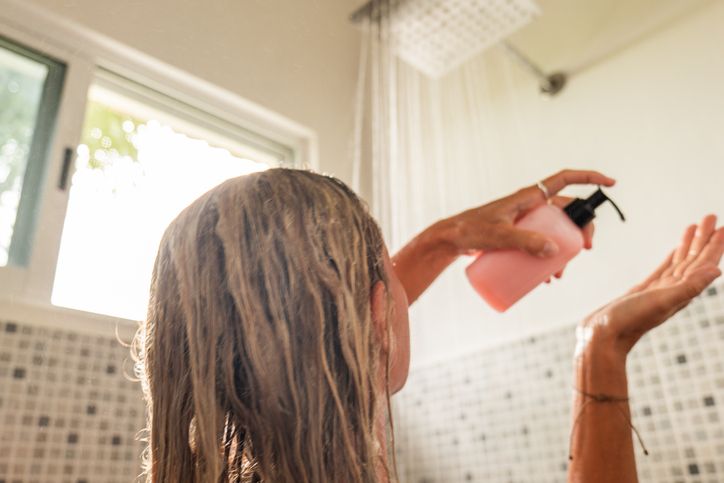
Switch Shampoos
When you suspect that your current shampoo might be contributing to hair fall, it's a good idea to explore alternative options. Consider transitioning to a milder shampoo that is sulphate-free. Sulphate-free shampoos are formulated to be gentler on your hair and scalp. By making this switch, you're reducing the likelihood of harsh chemicals stripping your hair of natural oils, which can lead to breakage and hair fall. Pay attention to any changes in your hair's condition over the course of a few weeks after switching. This period allows your hair to adjust to the new shampoo and can give you insights into whether it's a better fit for your hair health.
Patch Test
If you suspect that a particular shampoo is causing irritation, it's wise to perform a patch test before applying it to your entire scalp. Choose a small area of skin on your forearm or behind your ear and apply a small amount of the shampoo. Wait for around 24 hours to see if any allergic reactions or irritation occur. If redness, itching, or discomfort arises, it's an indication that the shampoo might not be suitable for your skin type. This proactive step can prevent potential adverse reactions on your scalp and hairline.
Observe Changes
As you switch shampoos, it's crucial to closely monitor any changes in your hair's appearance, texture, and overall health. Keep a record of how your hair behaves after each wash. Notice if your hair feels softer, stronger, or less prone to breakage. Additionally, observe if there's a decrease in hair fall during and after washing. This observational approach helps you make informed decisions about whether the new shampoo is positively impacting your hair's health.
Consult a Professional
If you're experiencing persistent and noticeable hair fall, especially if it's accompanied by other symptoms or concerns, seeking professional advice is recommended. Dermatologists and trichologists specialise in hair and scalp health and can provide personalised insights. They can assess your hair and scalp condition, identify potential underlying causes of hair fall, and recommend appropriate treatments or adjustments to your hair care routine. A professional consultation ensures that you receive tailored guidance based on your unique situation, helping you address the issue effectively.
Remember that hair care is not a one-size-fits-all approach, and what works for one person may not work for another. By being proactive, observant, and seeking professional guidance when needed, you can better understand the relationship between your hair care routine and hair fall, ultimately promoting healthier hair.
4
Reduce Hair Shedding Step by Step: 10 Remedies to Help You Get Back Smooth and Thick Hair
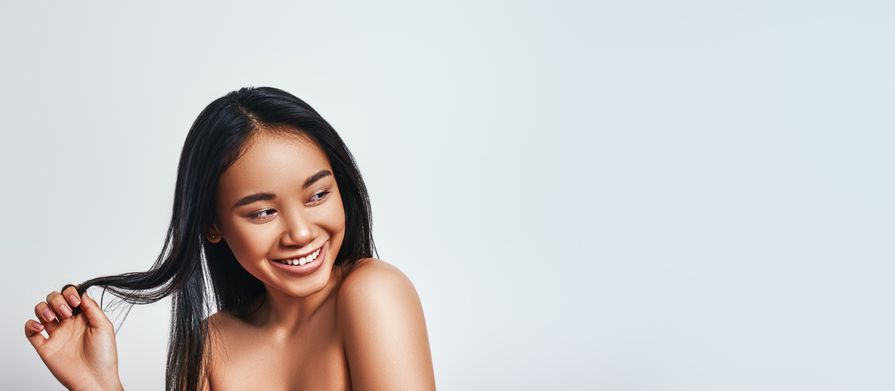
You might realise you lose more hair as you age, but there are multiple ways that you can try to keep the growth phase normal so that your hair remains vibrant and healthy. These methods encompass adopting a balanced diet rich in essential nutrients, practising gentle hair care routines, and implementing stress-reduction techniques.
1. Nutritious diet
Consuming a balanced and nutrient-rich diet plays a vital role in maintaining healthy hair. Nutrients like vitamins, minerals, and proteins are essential for strong hair growth. Foods such as spinach, eggs, nuts, and fish are rich in iron, biotin, and omega-3 fatty acids. These nutrients contribute to the overall health of your hair, preventing issues like hair breakage and dullness.
2. Gentle hair care
Opting for gentle hair care practices is crucial to avoid damaging your hair. Harsh chemicals found in some shampoos can strip your hair of its natural oils, leading to dryness and weakening. Choosing sulphate-free shampoos and minimising the use of heated styling tools helps maintain the integrity of your hair shaft.
3. Scalp massage
Regular scalp massages offer multiple benefits for your hair health. Massaging your scalp improves blood circulation, ensuring that hair follicles receive adequate nutrients. This practice also relaxes the scalp and reduces stress, promoting a healthy environment for hair growth.
4. Avoid tight hairstyles
Hairstyles that pull tightly on your hair, such as tight ponytails or braids, can stress the hair shaft and lead to breakage. Opt for looser hairstyles that don't strain the hair follicles. Wearing your hair down or in a loose bun allows your hair to maintain its strength and minimise the risk of hair fall due to tension.
5. Stay hydrated
Proper hydration is essential for maintaining healthy hair. Drinking sufficient water keeps your hair and scalp hydrated, preventing issues like dryness and brittleness. Incorporating hydrating beverages like herbal teas and consuming water-rich fruits supports not only your overall health but also your hair's vitality.
6. Natural remedies
Natural remedies can provide beneficial nutrients for your hair and scalp. Aloe vera gel soothes inflammation, maintains scalp health, and nourishes hair follicles. Coconut oil's moisturising properties help strengthen hair strands and prevent breakage. Onion juice's sulphur content can stimulate hair growth when applied to the scalp.
7. Reduce stress
Chronic stress can contribute to hair fall by disrupting the hair growth cycle. Engaging in stress-reduction techniques like meditation, deep breathing, or spending time in nature helps lower stress hormone levels. These practices promote a balanced environment for healthy hair growth.
8. Avoid smoking and excessive alcohol
Smoking restricts blood flow to hair follicles, impacting their health and contributing to hair fall. Excessive alcohol consumption can lead to dehydration, affecting the overall health of your hair. Quitting or reducing smoking and moderating alcohol intake positively influences your hair's well-being.
9. Consider hair regrowth treatment
Low-level laser treatment (LLLT) is a non-invasive option that might help prevent further hair loss and stimulate regrowth in some cases. It's important to note that results can vary, and there might be mild side effects like scalp irritation or headache.
10. Consult a professional
If you're experiencing sudden and excessive hair loss without a clear cause, seeking advice from a professional is essential. Consulting a dermatologist or a trichologist can help identify underlying issues, create a tailored treatment plan, and ensure the health of your hair.
Remember that maintaining healthy hair involves a combination of practices, lifestyle choices, and professional guidance when needed. Consistency and patience are key factors in achieving and maintaining optimal hair health!
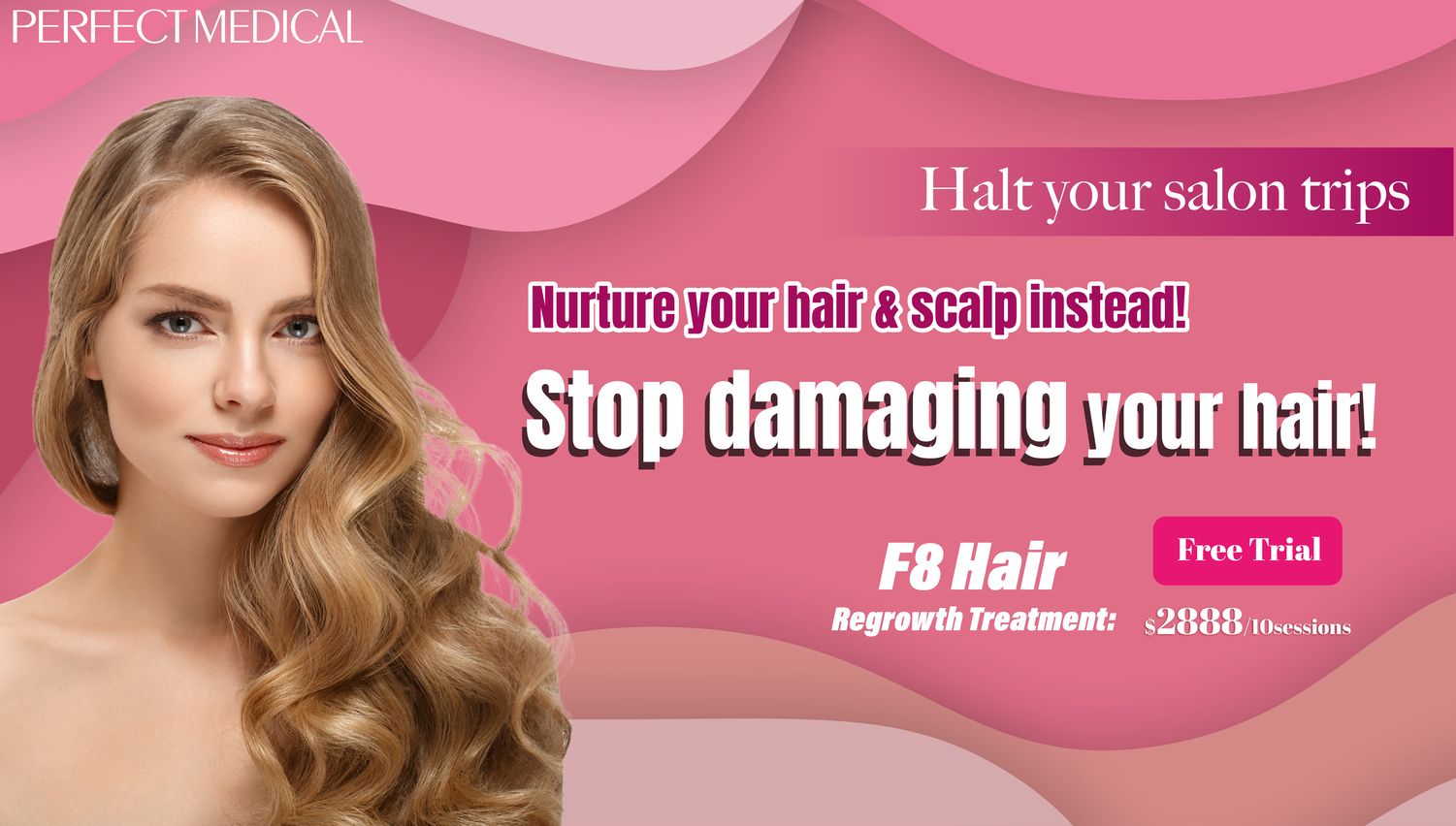
免費體驗
F8 Hair Regrowth Treatment
1 Minute Self-Registration
Date should not be before minimal date
FAQ

1. Is hair fall a sign of ageing?
While hair fall can indeed be linked to the ageing process, it's important to understand that it's not the sole factor. As we age, the rate of hair growth naturally slows down, and hair density might decrease. However, excessive hair fall can be caused by various factors, including genetics, hormonal changes, medical conditions, stress, and poor hair care practices. It's crucial to differentiate between normal age-related hair changes and more significant hair loss issues that might require attention and intervention.
2. Do women with female pattern hair loss lose hair faster than others?
Yes, women experiencing female pattern hair loss (androgenetic alopecia) can often notice a faster rate of hair thinning compared to others. Female pattern hair loss typically involves a gradual thinning of hair around the crown and top of the scalp. This condition is influenced by genetic factors and hormonal changes, and the progression can vary from person to person. Seeking professional advice early can help manage and slow down the progression of this type of hair loss.
3. Can hair fall be caused by frequent hair colouring?
Frequent hair colouring or chemical treatments can contribute to hair fall, especially if done improperly or excessively. Harsh chemicals in hair dyes can weaken the hair shaft and strip it of its natural oils, making it more prone to breakage. Using low-quality products or not following proper application and aftercare instructions can worsen this effect. It's important to choose quality hair colour products and give your hair adequate time to recover between colouring sessions.
4. Are hair fall supplements effective?
Hair fall supplements can be effective, but their efficacy depends on various factors. If hair loss is due to specific nutrient deficiencies, supplements containing essential vitamins, minerals, and amino acids can help support hair health. Biotin, vitamin D, iron, and zinc are among the nutrients that play a role in hair growth. However, it's crucial to consult a healthcare professional before starting any supplements, as they can recommend appropriate options based on your individual needs and rule out other underlying causes of hair loss.
5. Is weight loss and hair fall related?
While there can be a link between weight loss and hair fall, it's not a strict rule that applies to everyone. Rapid and extreme weight loss, especially if accompanied by a restrictive diet, can lead to nutritional deficiencies that impact hair health. Drastic weight loss can cause the body to divert nutrients away from hair follicles, leading to temporary hair shedding. However, gradual and balanced weight loss that includes proper nutrition is less likely to have a significant impact on hair health.






